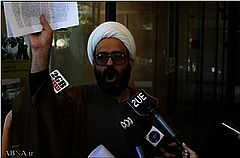This Was a Cheap Plan by Australia and the US
» Iranian Officials Respond to the Kidnaping in Sydney
In addition to the remarks made by Iran’s adviser on international affairs to the country’s supreme leader who called the kidnaping event in Sydney, Australia, a “cheap plan” by Australia and the United States, a senior Iranian cleric characterized the terrorist act as the “work of the enemy.” Iran’s deputy foreign minister criticized the Australian government for giving asylum to the Iranian-born kidnaper. The foreign ministry and police officials had earlier claimed that they had warned Canberra of the self-proclaimed sheikh’s condition.
The rather unusual response came from ayatollah Khamenei’s senior advisor Ali Akbar Velayati, who considered a moderate among Iran’s conservatives when he said, “this was a cheap plan devised by Australia’s intelligence system following America.”
Velayati, who was the foreign minister in the 1980s and 1990s mentioned the Australian terrorist attack during a seminar, said, “Australia cooperates in everything that the West does against the Muslim world and the Third World. Its ability is at this level, to engage in such a cheap act and then make propaganda use of it and then throw accusations at individuals.”
The terrorist attack in Sydney turned into an event of special interest to Iranian officials after Australian police said that the kidnapper who was ultimately killed by Australian commandoes in the raid was an Iranian refuge Mohammad Hassan Manteghi who had changed his name to Haron Monis, and claiming to be a sheikh.
The kidnaper is said to have changed his faith from Shiism to Sunnism.
While Australian and Western media have paid little attention to the kidnaper being a cleric or even Iranian, and have focused primarily on the problems he had with the law during his stay in Australia, including his mental state and the shortcomings of Australian security and police, officials of the Islamic republic seem to be concerned that the world community and Western media may try to link the self-proclaimed sheikh to the Iranian regime or Shii clerics. This may be the reason why Velayati also said, “It would not be surprising to learn that this person had never even been to a clerical seminary. He was an Iranian with mental problems. They prepared photos of him and then said that he had changed his faith from Sunnism to Shiism or become a supporter of the Islamic State. What is surprising is that this person walked around the streets of Australia freely and the police did not do anything about him. So it seems unconvincing.”
In the course of the kidnaping of 16 people in a Sydney café, Sheikh Haron claimed that he was a supporter of the Islamic caliphate group (also known as IS, ISIS or ISIL), the group that the Ghods Force of the Revolutionary Guards says it is fighting in Iraq. Until a few days ago, his personal website claims that he had pledged his support to the Islamic caliphate leader Abu Bakr Baghdadi.
Even though two Australians were also killed in the siege, along with Sheikh Haron, even some senior clerics in Ghom said the event was orchestrated by the “enemies.” For example, ayatollah Mohammad Ali Alavi Ghorgani told a group of Basij members from the city of Ghom, “The enemy, which is after weakening Islam and destroying its divine face, has now embarked on taking advantage of the cleric robes to accomplish its goal.”
The first response to the Sydney attack came from Marzie Afkham, the spokesperson of the foreign ministry. “The record and mental condition of this Iranian emigrant who had moved to Australia two decades ago had been repeatedly reported to Australian officials. They knew very well his condition,” she said and continued, “resorting to inhuman methods and creating terror in the name of Islam is unacceptable under any circumstances.”
Iran’s chief of police who has been on the job for about a decade, Morteza Ahmadi Moghadam, told reporters on Tuesday, “In coordination with the judiciary and Interpol, we had requested Australia to extradite Mohammad Hassan Manteghi in 1990.” According to him, Manteghi was the manager of a transport company in 1996 and had fled to Malaysia after a corruption case and then went to Australia using a fake name. Australia turned down our extradition request because of the absence of an extradition treaty between the two countries.”


